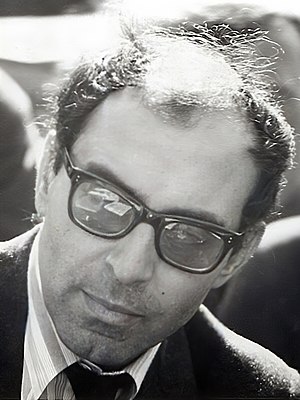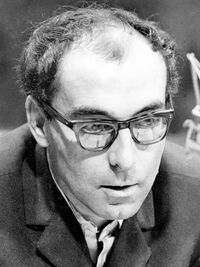Jean-Luc Godard
Relevance
Directed Bande à part (1964), cited as an influential film by Morrissey.
See also:
Anna Karina
Claude Brasseur
Wikipedia Information
 |
Jean-Luc Godard (UK: GOD-ar, US: goh-DAR; French: [ʒɑ̃ lyk ɡɔdaʁ]; 3 December 1930 – 13 September 2022) was a French and Swiss film director, screenwriter, and film critic. He rose to prominence as a pioneer of the French New Wave film movement of the 1960s, alongside such filmmakers as François Truffaut, Agnès Varda, Éric Rohmer and Jacques Demy. He was arguably the most influential French filmmaker of the post-war era. According to AllMovie, his work "revolutionized the motion picture form" through its experimentation with narrative, continuity, sound, and camerawork. During his early career as a film critic for Cahiers du Cinéma, Godard criticized mainstream French cinema's "Tradition of Quality" and championed Hollywood directors like Alfred Hitchcock and Howard Hawks. In response, he and like-minded critics began to make their own films, challenging the conventions of traditional Hollywood in addition to French cinema. Godard first received global acclaim for Breathless (1960), a milestone in the New Wave movement. His work makes use of frequent homages and references to film history, and often expressed his political views; he was an avid reader of existentialism and Marxist philosophy, and in 1969 formed the Dziga Vertov Group with other radical filmmakers to promote political works. After the New Wave, his politics were less radical, and his later films came to be about human conflict and artistic representation "from a humanist rather than Marxist perspective." He explained that "As a critic, I thought of myself as a film-maker. Today I still think of myself as a critic, and in a sense I am, more than ever before. Instead of writing criticism, I make a film, but the critical dimension is subsumed. I think of myself as an essayist, producing essays in novel form or novels in essay form: only instead of writing, I film them." Godard was married three times, to actresses Anna Karina and Anne Wiazemsky, both of whom starred in several of his films, and later to his longtime partner Anne-Marie Miéville. His collaborations with Karina in Vivre sa vie (1962), Bande à part (1964) and Pierrot le Fou (1965) were called "arguably the most influential body of work in the history of cinema" by Filmmaker magazine. In a 2002 Sight & Sound poll, Godard ranked third in the critics' top ten directors of all time. He is said to have "generated one of the largest bodies of critical analysis of any filmmaker since the mid-twentieth century." His work has been central to narrative theory and has "challenged both commercial narrative cinema norms and film criticism's vocabulary." In 2010, Godard was awarded an Academy Honorary Award. He was known for his aphorisms, such as "All you need to make a movie is a girl and a gun" and “A film consists of a beginning, a middle and an end, though not necessarily in that order.”
Related Forum Threads
- [Morrissey Central] Jean-Luc Godard (September 13, 2022) - Morrissey-solo (Sep 14, 2022)
